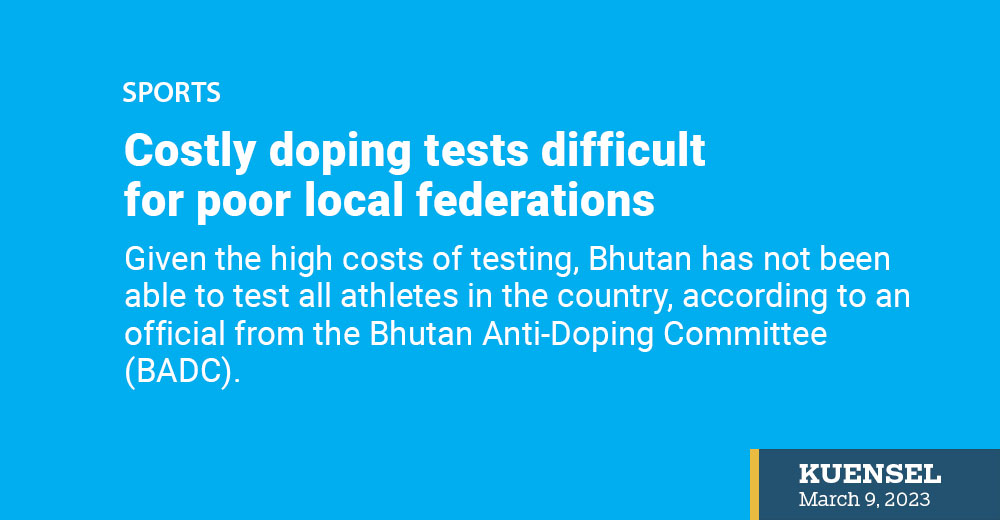Thinley Namgay
Given the high costs of testing, Bhutan has not been able to test all athletes in the country, according to an official from the Bhutan Anti-Doping Committee (BADC).
Sending a test sample from an athlete to World Anti-Doping Agency (WADA) accredited laboratories costs a minimum of USD 400 a test excluding airfare, according to the official.
Nima Gyeltshen from the BADC said that the committee has so far tested selective athletes from federations and associations and all have come out clean. However, he said that the country cannot be complacent about this serious global sports issue.
“We cannot directly go and collect the sample. There is a lot of documentation to be done as per the norms of WADA,” he said.
Doping simply means unethical means to boost one’s performance in any competition. Doping simply does not refer to the use of prohibited substances such as anabolic steroids. It can be also done through blood or gene transfer, supplements, and sports gear among others.
He said that if more tests were done then there could be some doping cases in the country.
“But it is difficult considering the shortage of resources. Some samples will take a decade to examine. Some involved in doping are prudent and even modern scientific methods fail to examine it quickly,” he said.
Nima Gyeltshen said that doping was against universal sports values such as fair play, celebration and sincerity. “Doping affects athletes’ health, and tarnishes the image of athletes, coaches, officials and the country.”
He said as per the mandate of the WADA, the anti-doping committee in any country should be autonomous and independent. “However, BADC is not yet independent,” he said.
Bhutan is among 191 countries that have so far ratified the international convention against doping in sports.
The local sports federations and associations are yet to inculcate anti-doping activities as part of their training programme as per the officials. Moreover, athletes and coaches are not fully aware of doping.
Today, federations and associations hardly check athletes before going to international competitions, and recruit foreign players and coaches.
Officials said athletes and coaches must be familiar with the new changes in the international doping rules and substances.
Bhutan Olympic Committee’s Secretary General Sonam Karma Tshering said that the prospect of doping is high today considering that sports are becoming more competitive and commercial. He said the respective federations and associations need to realign their sports mandate and make anti-doping activities part of their programme.
Dr Kipchu Tshering from the KGUMSB said there are some therapeutic use exemptions (TUE) if the athletes are using a prohibited substance. However, he said it has to be prescribed by a certified doctor.
Curriculum expert of the Department of School Education, Dawa Gyeltshen (PhD) said that as a sustainable approach to combat doping, a value-based education is required in the schools.
He said value-based education promotes a universal framework for learning values, cognitive skills, and decision making and social and relationship skills.


